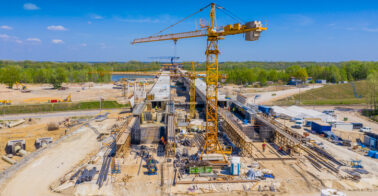Worth Thinking About: Yes or No?


When you own a construction business, it’s easy to fall into the trap of saying “yes” to every job that comes your way. More work means more money, right? Not necessarily. Taking on every project, regardless of the size, scope, or client, is one of the biggest mistakes a construction company owner can make. In a fast-paced and demanding industry, it’s easy to lose sight of the bigger picture, but learning when to say no is a critical skill for building a thriving, sustainable business. Saying no isn’t just about turning down bad deals—it’s about protecting your team, your reputation, and your bottom line.
Look For The Signs…
One big sign that a new project might not be right, is a mismatch with your company’s expertise. Unless you’ve been strategically building up the capacity to go after new markets, taking on a job that falls outside your core competencies can lead to costly mistakes, delays, and a less-than-stellar build. Another red flag is an unrealistic client. Seriously consider saying no to potential clients who demand impossibly tight deadlines, refuse to agree on a clear scope of work, or show a pattern of indecisiveness and frequent changes before the contract is even signed. These behaviors often foreshadow a difficult and unprofitable working relationship. Of course it’s also key to consider the financial viability of all projects before automatically saying yes. A low-bid job might seem appealing on the surface, but it can quickly become a money pit if it doesn’t adequately cover your overhead, labor, and unexpected costs. A project that starts with a handshake and vague promises, rather than a solid contract and clear payment schedule, is a disaster waiting to happen.
Even when there are plenty of good reasons to say no to a project, doing so can actually be quite hard, as Merrill Stewart, Founder and CEO of The Stewart/Perry Company, acknowledges: “In business, most of the time it’s easier to say “yes.” We wish to serve, to solve problems and keep our customers happy.” Nonetheless, saying yes is not always the right answer, and Stewart offers this advice about avoiding the sabotaging syndrome of “yes-icide”:
…Sometimes the easiest way for a service provider to create a poor reputation or worse is not having the courage to say “no” for the right reasons, as in the case of “No, we do not have that capacity right now.” As much as we would like to take on the extra work or fulfill the client request, it’s a narrow trail we walk…and saying “yes” can get you off the path just as quickly as saying “no.” With new business, we are all conditioned to say “yes,” even to counterproductive requests. Sometimes saying “no” will make more money for all parties. This is definitely a skill set learned from experience. Being honest about capacity or resources serves everyone and at times requires courage.
Getting Set For Success
Saying yes to overly optimistic timeframes is a challenge many construction companies are familiar with. Since unrealistically compressed schedules cause real problems, try to anchor business on more realistic project planning. At Planera, Nitin Bhandari points out that careful, inclusive, project planning can dramatically improve the outcomes of projects, and ultimately business profitability. Taking time to gather intel and input about the realities of a project may feel slow and painful, but doing so is really the only way to get projects–and the people executing them–off to a solid start. Bhandari offers these three pointers for developing more viable project plans:
- Instead of relying solely on scheduling specialists, general contractors should actively involve a diverse range of project stakeholders in the schedule development process. This includes project managers, superintendents, foremen, and key subcontractors – the individuals with firsthand knowledge of the tasks, durations, and potential challenges involved.
- Next-generation construction scheduling solutions are emerging to facilitate this collaborative approach. Platforms like Planera, for example, offer intuitive and visually driven interfaces that make the scheduling process accessible to a broader range of team members….These tools empower teams to collectively build a master schedule that reflects a more comprehensive understanding of the project.
- Schedules developed with input from various perspectives are inherently more realistic and account for a wider range of potential constraints and dependencies. This leads to greater buy-in from the entire project team…..Consequently, there is a greater sense of shared responsibility for adhering to the schedule and proactively identifying and addressing potential issues.
Ready for Strategic Growth?
Colonial Surety helps contractors with businesses of every size build their capacity. Our Hometown Bond Program helps local builders get credit based underwriting bonds for up to $250k—no financial statements required.
Growing from there, construction business owners can get in on more action by qualifying for The Partnership Account® for Contractors. Once qualified, you’ll use our power of attorney to issue your own bid bonds, in minutes. Order performance bonds with speed and ease too. Plus, you’ll bid and win more than ever as you leverage your:
- surety line of credit—in writing;
- private digital dashboard;
- daily snapshot of single and aggregate limits
- ability to update work on hand
Surety Bond programs for construction businesses of every size are right here: Bonding Programs at Colonial Surety Company
Founded in 1930, Colonial Surety Company is a leading direct seller and writer of surety bonds and insurance products across the USA. Colonial is rated “A Excellent” by A.M. Best Company and U.S. Treasury listed. Let’s connect today: Colonial Surety Company


